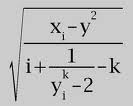Mathematics is probably the most dreaded subject among students, oftentimes seen as difficult and hard to learn.
Truth to the matter is that the adverse attitude of students towards math is one of the reasons why these young people are behind in math proficiency.
It is either they fear the subject or they have little interest or poor motivation of the subject.
Whatever the reasons may be, we have to understand that there are many factors influencing poor performance of students in math.
Among them are incoherent curriculum, substandard instruction with incompetent teachers at the helm and overpopulated classrooms.
To overcome these scenarios, it has to improve math curriculum in order to be coherent, it has to introduce modern teaching strategies.
Teachers need to be resourceful and creative in order to stimulate student’s interest for the subject.
Math teachers are also encouraged to undergo training, seminars and workshops in order to improve their teaching skills and benefit from them.
Excellence in math can be realized if people have the right attitude towards what they do be it in studies or in work.
To those who think that excelling in math is nearly impossible better think it again, maybe some math myths are still lurking and hounding inside your head that need a turn around to change its landscape.
Herewith, are a number of math myths to debunk:
Myth 1 : You need a ‘math gene’ or dominance of your left brain to be successful in math. – The truth, like reading, majority of people are born with the ability to do math computations.
Children and adults need to maintain a positive attitude. They must believe that they can do it. Math must be nurtured with a supportive learning environment that promotes risk taking and creativity, one that focuses on problem solving.
Myth 2 : There is only one solution in each math problem. – The truth is, there are a variety of ways to solve math problems and a variety of tools to assist you. There are different approaches in solving the problem and a variety of ways to arrive at the solutions. Everyone is using their own learning style in solving the problem.
Myth 3 : If you are good in numbers and at calculating, then you are good in math. – The truth is, one should be good in analysis in order to solve even the most difficult math problems.
